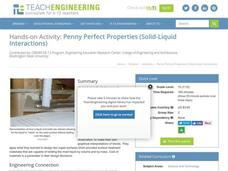California Department of Education
Evaluating Web Sites
If it's on the Internet, it must be true—right? How can someone tell if a website contains less-than-truthful information? Savvy surfers evaluate sources in the fifth of a six-part college and career readiness instructional activity...
Curated OER
Team Moon
Students read "Team Moon: How 400,000 People Landed Apollo 11 on the Moon," by Catherine Thimmesh. They watch portions of the movie "Apollo 13." Students use the internet and the attached study guide to discover specific information...
Curated OER
From Lake to Tap
Middle schoolers use the Internet to study how water is treated to make it safe to drink. They use a tutorial on the U.S. Environmental Protection Agency's website to gain this information. They complete a worksheet for the assessment...
Curated OER
Exploring the Smithsonian
Students explore the Smithsonian Institute. In this technology and history activity, students work in pairs to complete a worksheet by researching questions using the Smithsonian Institute website.
Curated OER
Bridge Construction
Students build a model of a bridge and test the amount of weight it support. They identify different types of bridges: suspension, arch, girder, truss, cantilever, cable-stayed and moveable.
Curated OER
Stable and Unstable Structures
Students consider ways to create stable bridges. In this bridge design lesson, students view pictures of bridges that have collapsed. They use the information to work in small groups creating a blueprint for a bridge of their own. Their...
Curated OER
Engineering: Lego Cars and Light Sensors
Students build Lego cars with attached light sensors. They program the car to enter a tunnel and reverse out when it records a darker light reading.
Curated OER
Plate Tectonics
Students simulate the three types of plate boundaries using robots. In this earth science lesson plan, students explain how earthquakes and volcanoes are formed. They collect real-world earthquake data and plot them on the map.
Teach Engineering
Android App Development
Building an accelerometer app for your Android device. Groups develop an app that uses the accelerometer on an Android device. The purpose of the activity is to reinforce the programming design. The post activity assessment challenges...
Teach Engineering
Android Acceleration
Prepare to accelerate your Android. Pupils prep for the upcoming activity in this third installment of a four-part series. The lesson progresses nicely by first introducing different types of acceleration to the class. The teacher...
Teach Engineering
Red Rover Robotics
Help your class understand the importance of exploration using robots. with a resource that provides a short history of robotics as a lead into looking at Martian robotic exploration missions. The activity specifically looks at the...
Teach Engineering
Stop the Stretching
Stretch your teaching repertoire with an experiment on the elongation (stretching) and failure (break) of several materials. The point of the experiment is to design a composite material for chair webbing.
Teach Engineering
Challenges of Laparoscopic Surgery
Get some laparoscopic training without the pain with an activity that challenges class members to find out what it is like to perform laparoscopic surgery. Teams perform three different tasks and quantify their performance. The activity...
Teach Engineering
Exploring Acceleration with an Android
Small groups use rubber bands to accelerate an Android device along a track of books. They collect the acceleration data and analyze it in order to determine the device's velocity.
NASA
Pop! Rockets
Off they go — launching rockets is fun. The lesson plan contains templates to build paper rockets that can be launched from a PVC pipe launcher. Individuals or groups build the rockets and determine the shapes for their fins. Included...
Teach Engineering
Inside the DNA
Get your class to take a closer look at DNA. Pupils conduct research to determine the methods used by scientists to analyze the molecular structure of DNA. The class members investigate different types of molecular imaging along with gel...
Teach Engineering
Microfluidic Devices and Flow Rate
When you have to flow, you have to flow. The lesson introduces class members to microfluidic devices and their uses in medicine. They watch a short video on how the diameter affects the rate of flow. The worksheet has individuals...
Teach Engineering
Penny Perfect Properties (Solid-Liquid Interations)
I can get more water to stay on a penny than you can! Collaborative pairs determine the volume of liquids that can be contained on the surface of copper pennies and plastic coins. The pairs analyze their results using graphs and go on to...
Teach Engineering
Making Model Microfluidic Devices Using JELL-O
Nothing flows like J-E-L-L-O! In the final portion of a four-part series, pupils create scale models of microfluidic devices out of gelatin and bendable straws. They use their devices to test various flow rates in the delivery of...
Teach Engineering
Creepy Silly Putty
It might be silly to determine the creep rate of putty but groups will enjoy making different formulations of silly putty and playing with them to understand how the different mixtures behave. The second part of the activity has groups...
Teach Engineering
Using Hooke's Law to Understand Materials
Provide a Hooke for a lesson on elasticity with an activity that has groups investigate a set of springs. They use a set procedure to collect data to calculate the spring constant for each spring using Hooke's Law. The groups predict the...
California Department of Education
Possible Careers
Is a STEM career the right choice for me? Lesson four in a six-part career and college readiness series introduces seventh graders to the world of STEM occupations. Individuals use their Holland code results to select, research, and...
National Sailing Hall of Fame
Sailboat Design Requirements
Sailboat design requires more than a half-circle and triangle sketch. After viewing a slideshow presentation that outlines the requirements for sailboat design, learners draw a design, perform the needed calculations, and write a paper...
Curated OER
Blazing Gas
Fourth graders read and discuss the sun and the energy we use on Earth from the sun. In this sun lesson plan, 4th graders discuss the solar system, planets, and answer short answer questions.

























